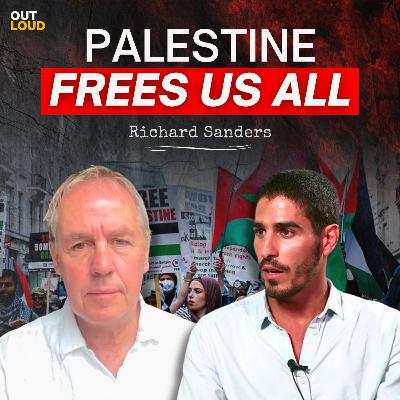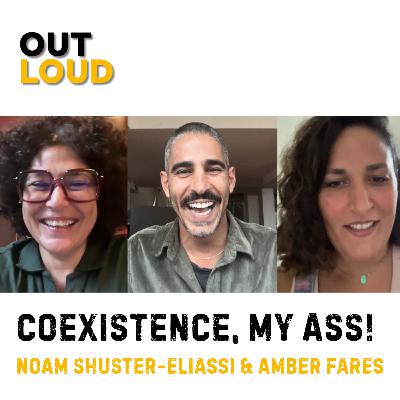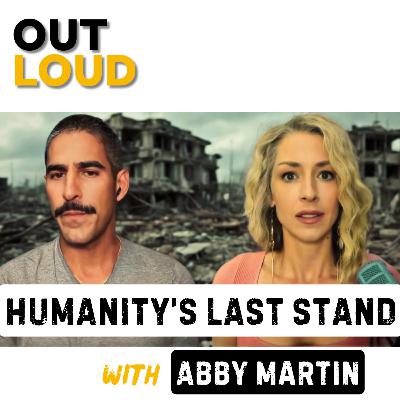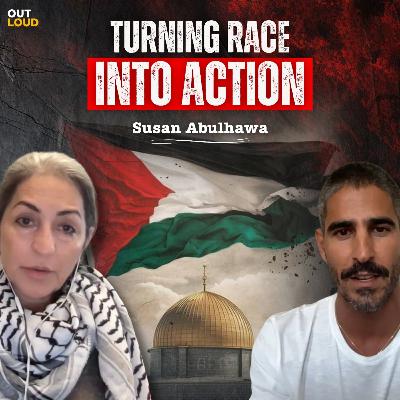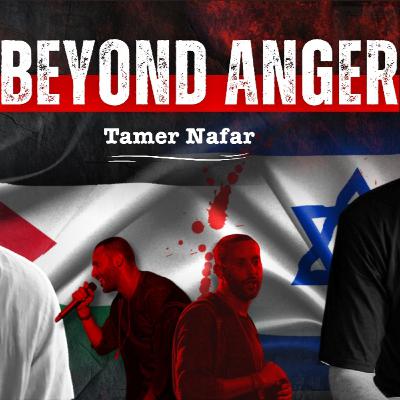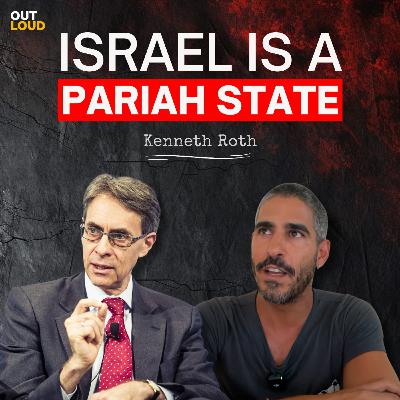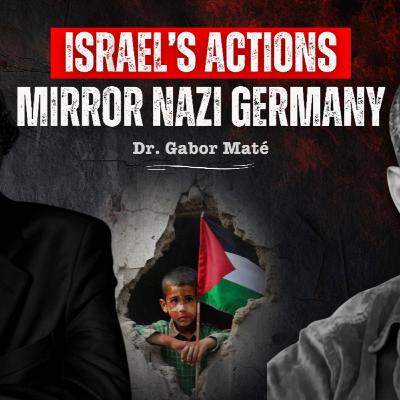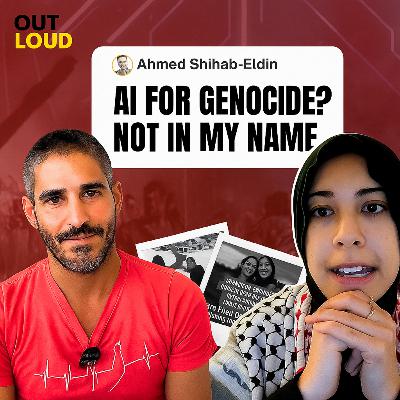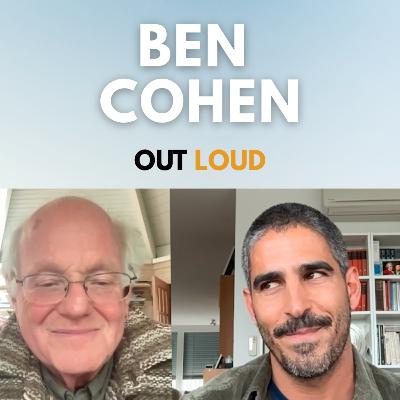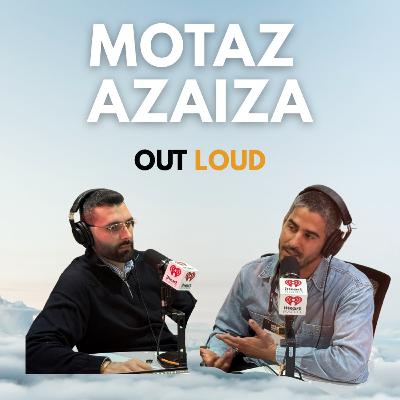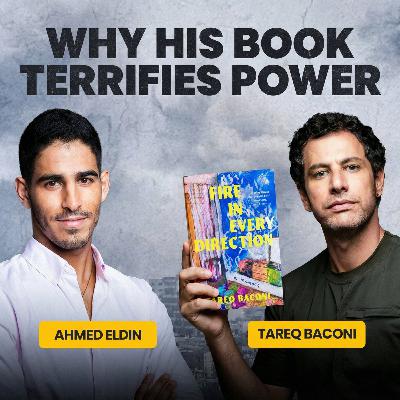Discover Out Loud with Ahmed Eldin
Out Loud with Ahmed Eldin

Out Loud with Ahmed Eldin
Author: Ahmed Eldin
Subscribed: 22Played: 106Subscribe
Share
© Ahmed Eldin
Description
In a world overflowing with noise and division, this podcast cuts through the chaos with candid conversations that matter. Each week, award-winning journalist Ahmed Shihab-Eldin sits down with activists, artists, thinkers, and disruptors—people bold enough to challenge the status quo and brave enough to reimagine what connects us. From art and identity to technology and social justice, Out Loud is where truth speaks, and systems get questioned. Together, we'll explore the ideas and stories shaping our world—and invite you to find your voice in the process.
11 Episodes
Reverse
“The Israelis look like the Nazis in their rhetoric, their behavior.” Award-winning journalist Richard Sanders unleashes unfiltered truth on Out Loud, exposing the grotesque genocide in Gaza and the collapse of the “rules-based order.” Palestine might just free us all – but only if we face the racist ethno-state head-on.Sanders rips into the West’s complicity: no sanctions, no arms halt, just humiliating servitude to empire (“Britain waits by the phone for America’s orders”). From gaslighting Palestinians’ fight for rights as antisemitism to pensioners arrested for supporting Palestine Action while kids die from British bombs, the disconnect between media elites and people is stark. “When people show you who they are, believe them. No one can say they didn’t know.”The tide’s turning. Sanders predicts an emperor’s new clothes moment where the world wakes to Israel’s crude racism. He dives into Epstein’s impunity, Mossad shadows, and Israel’s deep ties to Western capitalism’s intelligence web – too embedded to fail? Think again. South Africa fell; so can this. “The salvation for Palestinians will be the people.”Join us to unpack Gaza’s starvation, West Bank “concentration camps,” and the criminalization of conscience. Vote out the genocidals. Overestimate humanity. Build media that dares to call Israel what it is: a racist fist of the West. “If not, give up and go home.”Timestamps:• 1:15: Media elite vs. people disconnect• 2:00: Tide turning against Gaza’s horror• 3:26: No sanctions, no shame – complicity exposed• 4:07: Britain’s humiliating foreign policy• 9:11: International law’s collapse• 13:49: Ethnic cleansing in broad daylight• 16:00: Racist gaslighting of Palestinian rights• 18:41: Israel’s Nazi-like behavior• 29:59: Palestine frees us all• 47:08: Vote non-genocidal leadersThanks for watching. Richard definitely didn’t hold back, neither should you!Don’t forget to like, comment, and share this conversation!Watch Richard’s award-winning film on Gaza: https://youtu.be/kPE6vbKix6A
Every few months, the world rediscovers the word peace.A ceasefire is staged, a headline sighs in relief — and for a moment, we all pretend coexistence is possible.But coexistence without equality isn’t peace — it’s PR.In this episode of Out Loud, I sit down with two women who refuse to perform peace — and instead expose its price:🎬 Amber Fares, the Lebanese-Canadian filmmaker behind Speed Sisters and Coexistence My Ass, and🎭 Noam Shuster-Eliassi, the Israeli comedian and activist whose story and stand-up form the heart of that new Sundance documentary.Together, we talk about:• The danger (and necessity) of being funny in a fascist moment• Growing up in the “Oasis of Peace” and seeing the myth of coexistence unravel• The cost of telling the truth in a society built on denial• How women are using comedy, art, and film to resist propaganda and reclaim empathy“What we’re saying in this film — Palestinians have been saying for decades,” Noam makes it a point to tell me.“If it’s easier for you to hear it from me, then that’s your homework.”🎧 Coexistence, My Ass is about courage, laughter, and the moral clarity we need to imagine real peace — not the photo-op kind.
Recorded just before the ceasefire — and released as Israeli forces violate it — this Out Loud episode with Abby Martin confronts Gaza not just as a tragedy, but as a mirror.From the Great March of Return to today’s live-streamed horror, Abby and I explore what Gaza exposes:— the death of moral illusion,— the collapse of journalism’s conscience,— and an empire that depends on permanent war.“We all see the Holocaust being live-streamed. It’s on our screens daily in 4K.” — Abby MartinAbby’s unflinching honesty cuts through propaganda to show why silence has become policy — and why love, solidarity, and collective defiance are humanity’s last stand.🎧 Listen to the full conversation and subscribe for new episodes of Out Loud with Ahmed Eldin.Follow:Ahmed Eldin → @ASE on X | SubstackAbby Martin → @AbbyMartin on X
In this searing episode of Out Loud with Ahmed Eldin, I sit with Palestinian novelist, poet, and activist Susan Abulhawa—bestselling author of Mornings in Jenin and Love in the Time of Genocide. Susan speaks with brutal clarity, refusing half-truths to confront the genocide in Gaza, the complicity of global powers, and the power of righteous rage. This isn’t just a conversation—it’s a reckoning.“I absolutely reject the policing of my speech when we’re being exterminated. I don’t give a shit about anybody’s feelings,” Susan declares, dismantling the myth of decorum while children are “shredded” and “burned alive.” She insists anger is no sin: “The thing that oppressors fear the most is the anger of the masses... It is a fuel.” Her words demand we channel rage into resistance, not silence.Gaza, Susan argues, is a hinge of history—a testing ground for a new model of AI-driven colonialism. “They’re developing a model wherein they will do the unthinkable,” she warns, exposing how Western elites normalize horrors to disempower us. From the Balfour Declaration to the Iraq War, she traces Zionism’s grip on global policy, noting, “The United States is totally subservient to Israel—they have hijacked our sovereignty.” Even Arab regimes’ growing trade with Israel wounds the collective soul.Yet Gaza’s defiance inspires: “Against all odds, two years on, over 85,000 tons of bombs, starvation—and they’re still fighting.” Susan celebrates Palestine Action’s UK activists, risking jail to shut down arms factories: “They are willing to pay the price... If more people do that, they can’t put us all in prison.” She rejects non-violence as a 75-year failure, demanding, “We want our homeland back... the full menu of human dignity.”This conversation isn’t easy—it’s meant to wake you. Susan exposes Zionism’s fragility, like uprooted trees collapsing in Tel Aviv, as Churchill noted: “If you don’t have roots, things will fall down.” Her call to escalate—through boycotts, protests, storytelling—reminds us: “Liberation comes from standing for the most defenseless.” She also teases her children’s book Palestine on the Moon (pre-order on her site) and a 2027 novel.⏱️ Timestamps0:00 – Intro2:05 – Why Susan went to Gaza6:15 – Gaza as the future of humanity10:42 – The psychology of helplessness & control16:30 – Why rage is a responsibility22:45 – Refusing euphemisms: naming genocide28:10 – Roots vs. “death technology”34:40 – Resistance and the right to fight back42:12 – Betrayal and Arab complicity48:25 – What sustains hope in Gaza53:50 – Channeling rage into responsibility1:00:20 – Susan’s upcoming books & Gaza anthology1:05:00 – Closing reflectionsSusan’s words burn: silence is complicity, anger is duty, hope is discipline. If this moves you, don’t stop here. Act: read untaught histories, join boycott campaigns, support legal funds, make art, show up in numbers. Share this episode, follow Susan on X, pre-order Palestine on the Moon, and donate to credible Gaza aid groups. Rage without action is despair. Rage with action is the seed of liberation.#gaza #israel #gazagenocide #palestine #palestinesolidarity #outloud #ahmedeldin #podcastUntil next time, stay loud.
In this raw and unfiltered conversation, rapper, actor, and screenwriter Tamer Nafar opens up about everything: learning English by translating Tupac lyrics with a dictionary, finding therapy as a lifeline when grief became unbearable, and why slogans like “coexistence” mean nothing when your very existence is under attack.“Every time I speak the truth, there’s a price. Concerts canceled, police at the door, my name smeared. But silence would cost me more… You think grief kills creativity, but it doesn’t. It mutates. Sometimes it even triples.”🎧 What you’ll hear in this episode:1.Why Tamer stopped performing music for a time2. How art became the “black box” of Palestinian history3. The emotional cost of daily grief and oppression4. Why Israeli “democracy” is a myth5. What Palestinians need beyond the illusion of coexistence6. How hip-hop, hope, rage, and exhaustion fuel resistanceIf you want to understand Palestine beyond the headlines — the lived reality of grief, resistance, and creativity — this episode is unmissable.👉 Watch till the end. Share with your community. Add your voice to the call for justice.⏱️ Timestamps:00:00 - Highlights01:15 - Introduction04:51 - Why did you stop performing music for a while?08:24 - The teenage years that shaped your music10:00 - Learning English through Tupac lyrics12:27 - Dictatorship against Palestinians14:45 - What it means to fight to exist in your own hometown17:06 - Is Israeli democracy real?21:32 - When settlers killed your neighbor25:32 - Keeping your soul alive under grief27:31 - When the struggle is flattened32:31 - What it means to be “Palestinian enough”35:06 - What fuels you now: hope, rage, or exhaustion?37:15 - Palestinian before artist40:56 - Final reflections🙏 Thanks for watching. Don’t forget to like, comment, and share this conversation.
Join host Ahmed Eldin on Out Loud as he sits down with Kenneth Roth, the former executive director of Human Rights Watch, for an unflinching, in-depth conversation on Gaza, US policy, Trump, and the struggle for accountability amid a growing consensus of genocide.In this episode, Roth reflects on the formative experiences that shaped his passion for justice, the ethical dilemmas faced by rights advocates, and the practical roadblocks to shifting global public conscience and policy. Key questions explored include:a) Can Trump be pushed to do the right thing on Gaza—and does his motivation matter if there’s progress?b) Why have some Gulf states started to see Israel as a greater threat than Iran?c) Is Israel now a pariah on the world stage, and what leverage remains to stop atrocities in Gaza?d) How does personal history—like families fleeing Nazi Germany or Palestine—shape views on present conflicts?e) What factors fuel the disconnect between public will and government action in Germany, the US, and beyond when it comes to arms and policy?f) What happens when elite institutions in the West, such as Harvard or Columbia, suppress critical debate on Palestine?g) Does the International Criminal Court have the power or leadership to achieve real accountability, especially with US hostility?h) How can hope persist for Gaza’s civilians in the face of slow-moving international responses, relentless violence, and severe media suppression?Ahmed and Kenneth Roth unpack the importance of building collective resistance, strategies for creating real policy shifts, tools to increase the cost of complicity, and why the conversations we have with friends, family, and colleagues matter in shaping a moral response to international crises.
In this explosive episode of Out Loud with Ahmed Eldin, Holocaust survivor and renowned trauma expert Dr. Gabor Maté exposes what few dare to say out loud: what Israel is doing to Palestinians in Gaza is energetically almost identical to what Nazis did to the Jews in Germany. We talk about trauma, dehumanization, complicity, and the collapse of so-called Western morality. From starvation and forced displacement to the use of food as a weapon — Gabor doesn’t hold back.This powerful conversation brings together voices like Omar El Akkad, Mohammed El Kurd, Francesca Albanese, and Ahmed Eldin to offer honest, nuanced perspectives on the ongoing humanitarian crisis, the roots of violence, and the urgent need for truth and justice.In this video, you’ll get:Dr. Gabor Maté’s insights on how trauma fuels cycles of violence affecting both Israelis and Palestinians.Perfect for anyone seeking to understand the Israel's genocidal war beyond the headlines . This video uses clear language to unpack complex ideas on genocide, war, trauma, and the ongoing struggle for justice.Stay informed on Israel's genocidal war in Gaza with expert voices guiding you through the facts and emotions driving this devastating chapter in world history. Don't forget to share this video with your friends and family! And let us know what you think in the comments!
“The moment they’re going to stop being complicit in genocide is when we make it too expensive for them to continue being complicit.”— Ibtihal Aboussad, Out Loud podcastIn this unmissable episode of Out Loud with Ahmed Eldin, Ibtihal unpacks her journey from coding “for good” in Morocco’s tech‑for‑development initiatives to confronting the harsh reality at the heart of Big Tech’s profit machine. She speaks candidly about:Colonial legacies and code: How growing up in Morocco instilled in her a history of resistance, and why she believed technology could serve the oppressed, until it didn’t.The whistleblower’s awakening: The day she realized that speech‑to‑text and cloud services she developed were fueling military operations.“Shame on you” at the AI summit: What drove her to interrupt Microsoft’s top brass in front of Bill Gates and Satya Nadella, and why that explosive moment rippled from Seattle to student protests in London and Casablanca.A blueprint for tech workers: Why every line of code you write in Big Tech is a choice—and how you can join the fight to make complicity untenable.Ibtihal’s story is more than a tech‑industry exposé; it’s a call to arms. She shows us that real power lies not just in boardrooms, but in the collective pressure of people refusing to stay silent. Whether you’re a coder, an investor, or someone who clicks “Accept Cookies” without a second thought, this conversation will stir something in you—and it might just change how you see your own role in global injustice.Timestamps00:00 - Highlights 00:59 - Introduction 01:53 - Where did you grow up? 03:10 - Have you had any similar experience like standing clear of the right things? 05:08 - What Drew you to AI? 08:36 - How has that reality of your life shaped your lens when it comes to power, identity, and belonging? 10:25 - Do you have a sense of belonging? 13:09 - Do you have an emotional encounter with Palestine? 15:16 - Microsoft's role in enabling the Israeli military.19:13 - Do you consider yourself a whistle-blower? 20:22 - What gave you courage the event with the AI CEO? 23:37 - Is there something people would be surprised to know about the reactions?26:59 - When the students chanted Ibtihaj, you make us proud what did you feel? 33:48 - What would you say to colleagues who feel uncomfortable, but are still there?36:29 - Are you encouraged by the growth of this movement? 38:03 - Quick Questions SUBSCRIBE ON SUBSTACK for bonus content🔔 Don’t forget to follow the podcast and share this episode with anyone who believes tech should serve humanity, not harm it.
🎙️ “You can ignore it, you can complain about it — or you can do something about it. And I feel better doing something about it.” — Ben CohenIn this episode of Out Loud, host Ahmed Eldin sits down with Ben Cohen, co-founder of Ben & Jerry’s, for a fearless, heart-centered conversation about war, justice, capitalism, and conscience.Ben has never been shy about mixing business with bold values. Now, he’s become one of the most unapologetically vocal Jewish-American critics of U.S. policy in Gaza — and he’s not backing down.We dive deep into:Why he disrupted a Senate hearing over U.S. military aid to IsraelHow his Jewish upbringing shaped his activismWhat links Gaza and Flint, MichiganWhy being bullied as a kid gave him a lifelong sense of justiceThe difference between caring and actingAnd what it really takes to bend the arc toward justice“They’ve sold their soul to the money. And I don’t think that’s what the people really want.” Subscribe, rate, and share if you're ready to challenge the status quo — and dream out loud.
There are two versions of Motaz Azaiza. There is the one etched into the consciousness of millions, lens slung over his shoulder, eyes bloodshot, not just from sleepless nights, but from witnessing what no one should ever have to. The man who didn't just document Israel's genocide in Gaza, he became a portal, a lifeline, a resistance not of weapons, but of truth. But then there is the other Motaz. The one I met at the Web Summit in Doha away from the rubble and sirens. The man, not the symbol. Still fierce, still unfiltered, but softer too, honest in a way that hurts. Human, in a way the internet often forgets to allow. We sat down, not to perform grief, but to process it. To talk, not for the algorithm, but for ourselves, about what it means to carry trauma while the world scrolls past. About how visibility is both a lifeline and a wound. This isn't an interview, it's a heart to heart, between two Palestinians, shaped by different histories, speaking from different wounds, but bound by the same longing for justice, for connection, for a future we have never been allowed to imagine. Don't forget to hit subscribe, leave a review, and share it with someone who needs to hear it.
A love story, a political narrative, and a tale of self-discovery converge in this intimate conversation. What happens when queerness, Palestine, exile, and truth-telling all intersect in one life? How do we reclaim ourselves when the world teaches us to hide?In this episode of Out Loud with Ahmed, I sat down with acclaimed writer and analyst Tareq Baconi (President of the Board of Al-Shabaka: The Palestinian Policy Network, author of Hamas Contained) to unpack his groundbreaking new memoir Fire in Every Direction.Together, they explore the emotional archaeology of first love, the silence of queer Arab boyhood, the inherited weight of the Nakba, and the price of telling the truth in a world collapsing under genocide. Tareq opens up about the letters that shaped him, the rupture that reshaped his family, and the lifelong work of integrating queerness, identity, politics, and belonging—without apologizing for any part of the whole.We also move through the political with brutal clarity: narrative, media, power, and why Palestinians are so often forced to “explain” themselves to institutions that don’t want to hear them. This is a conversation about shame and desire, generational rage and tenderness, chosen family and survival—and the impossible beauty of becoming whole while history is still burning.👉 If this moved you, like, subscribe, and share it with one person who’s trying to stay human in inhuman times.📖 Get Tareq Baconi’s book: Fire in Every Direction: A Memoirhttps://www.simonandschuster.com/books/Fire-in-Every-Direction/Tareq-Baconi/9781668068564More from Tareq:— Al-Shabaka: https://al-shabaka.org/authors/tareq-baconi/— Hamas Contained: https://www.sup.org/books/middle-east-studies/hamas-containedCHAPTERS01:08 Opening: Welcome to Out Loud02:44 Why Tareq Wrote the Book05:02 Reader Reactions & Emotional Impact07:00 Integrating Identity & Politics08:33 Writing Privately vs. Publishing13:03 Returning to Old Letters & Reconstructing Memory18:57 The Rupture: Love, Secrecy, and Shame22:00 Publishing a Memoir During Genocide32:04 Palestinian Maternal Rage & Legacy36:01 The Childhood “Look” & Social Policing39:58 The Weight of “Ayb” (Shame Language)54:32 Exile, Diaspora Privilege & Estrangement59:19 Storytelling as Resistance & Political Power01:08:10 Is Palestine the Litmus Test for Humanity?01:17:24 Closing Reflectionstags: Tareq Baconi, Fire In Every Direction, Palestine, Gaza, Queer Arab, Out Loud With Ahmed


